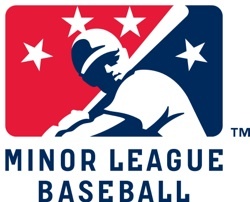 Goodbye International League, Sally League and Pacific Coast League: MLB’s reorganization is unveiled, with the four levels of Minor League Baseball marketed with ahistorical monikers.
Goodbye International League, Sally League and Pacific Coast League: MLB’s reorganization is unveiled, with the four levels of Minor League Baseball marketed with ahistorical monikers.
Wiping out over a hundred years of history, MiLB will be run in four levels–Triple-A, Double-A, High-A and Low-A (or, as charmingly named by MLB, A-). The announcement comes after Wednesday’s deadline for teams to accept the MLB invitations to join the new 120-team MiLB, and as we predicated, all 120 signed the Professional Baseball League (PDL) license that drastically overhauls the MLB-MiLB relationship. No, the irony that the Appalachian League and Pioneer League live on and the Texas League goes away is not lost on us–though we’ve received mixed signals about whether these league names will remain as announced or be altered in the future, perhaps sold to sponsors a la the NBA’s G League, with rights in this case sold to Gatorade.
“We are excited to unveil this new model, which not only provides a pipeline to the Majors, but continues the Minor Leagues’ tradition of entertaining millions of families in hundreds of communities,” MLB Commissioner Rob Manfred said in a press release. “In modernizing our Minor League system, we prioritized the qualities that make the Minor Leagues such an integral part of our game while strengthening how we develop professional athletes on and off the field. We look forward to demonstrating the best of our game throughout local communities, supporting all those who are working hard to grow the sport, and sharing unrivaled technology and resources with minor league teams and players.”
Some of those improvements, per MLB, include:
- Player salary increases ranging from 38-72% for the 2021 season.
- Modernized facility standards better suited for professional athletes.
- Improved amenities and working conditions for players and staff.
- Reduced in-season travel for players and coaches.
- Better geographical alignment.
Not all of this is due to the MiLB reorganization: player salaries are completely in control of MLB and weren’t really part of this agreement. MLB could have raised MiLB player salaries at any point. And a reorganization based on geography certainly was not controversial: MLB says parent teams will be on average 200 miles closer to their Triple-A affiliates, which isn’t as impressive as it sounds. A Target Field/CHS Field Green Line shuttle sounds great until you realize teams play half their games on the road, which means the Twins might need to call up a player from the St. Paul Saints when both on the road–say, when the Twins are in Seattle and the Saints in Columbus.
Other aspects of the agreement, such as the new facility standard, could have been worked out with MiLB. But there are plenty of changes to the MiLB operating structure not covered in the MLB statement: a shift from the MiLB franchise system to the MLB licensing system (giving MLB all the power in the relationship), MLB’s new “taxes” (for lack of a better term) that takes 5 percent of a purchase price from an owner selling a team as well as a fee for the buyer, more MLB involvement in ballpark leases, and more. Owners certainly were not working with their hearts and minds in deciding to accept the new PDL license; they signed because they really had no choice.
So here we are with new league structures and arrangements:
Now, if you’ve been reading our coverage for the last year-plus, the league reorganizations are not a surprise. Still, the fact that grand, historical names like the Southern League and the Carolina League are going away is a little distressing.
RELATED STORIES: ValleyCats suing MLB, Astros for loss of affiliation‘ Keurs to run Danville Appy League team; Bees join LumberKings in Prospect League; Clinton LumberKings join Prospect League; Sad ends to MiLB teams dumped by MLB; ValleyCats join Frontier League; Fresno guaranteed MiLB team through 2030; Mapping a baseball future outside of MiLB; Detroit retains Erie as affiliate: here’s why; Red Sox: We’ll fight to keep baseball in Lowell; Fresno agrees to Cal League move; 120-team MiLB lineup complete; No changes in Cardinals affiliates for 2021; Giants add Eugene to existing affiliates for 2021; Rangers return to Round Rock for 2021; Oakland adds Lansing to 2021 affiliate lineup; Pirates to bring back top affiliates; Mets confirm 2021 affiliate lineup; White Sox maintain farm system for 2021 and beyond; Cleveland returns top four affiliates for 2021; Cubs to return four affiliates for 2021; Dodgers: No change in 2021 team affiliates; Padres add San Antonio as new affiliate; Blue Jays choose Vancouver over Lansing; Astros add Asheville Tourists to three existing affiliates; Mariners see no affiliate changes in 2021; Brewers invite Nashville as new Class AAA affiliate; Nationals invite Rochester, Wilmington as new affiliates; Royals add Quad Cities, Columbia as affiliates; No changes in Boston Red Sox affiliates; No changes in Philadelphia Phillies farm system; Angels add Tri-City as affiliate, keep rest of system; Rays revamp farm system, adding Charleston and promoting Bowling Green; Twins revamp farm system with new St. Paul, Wichita affiliates; Braves add Augusta to affiliate lineup; D-Backs unveil 2021 affiliates; AA to Amarillo; Tigers announce 2021 affiliates: No change
